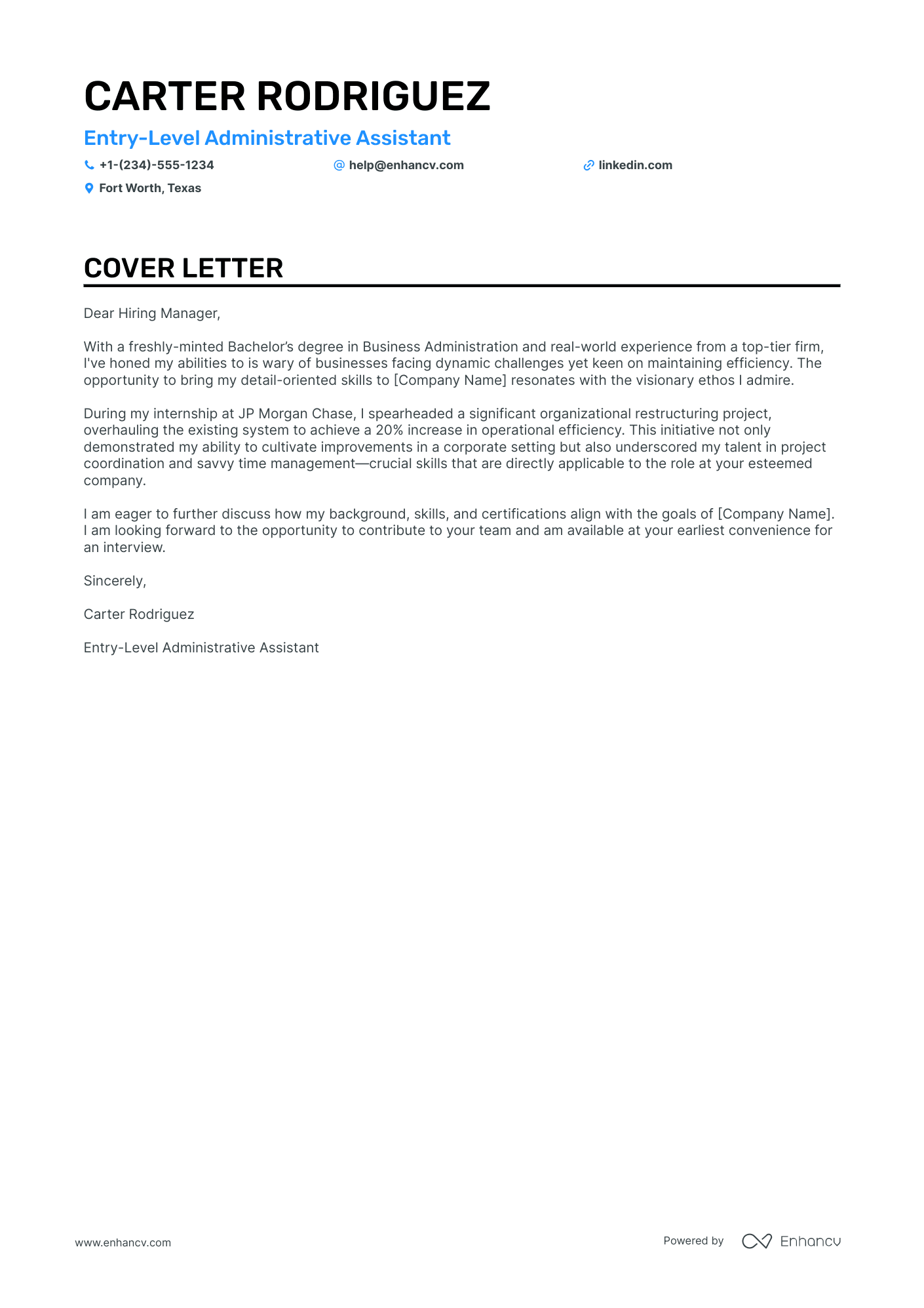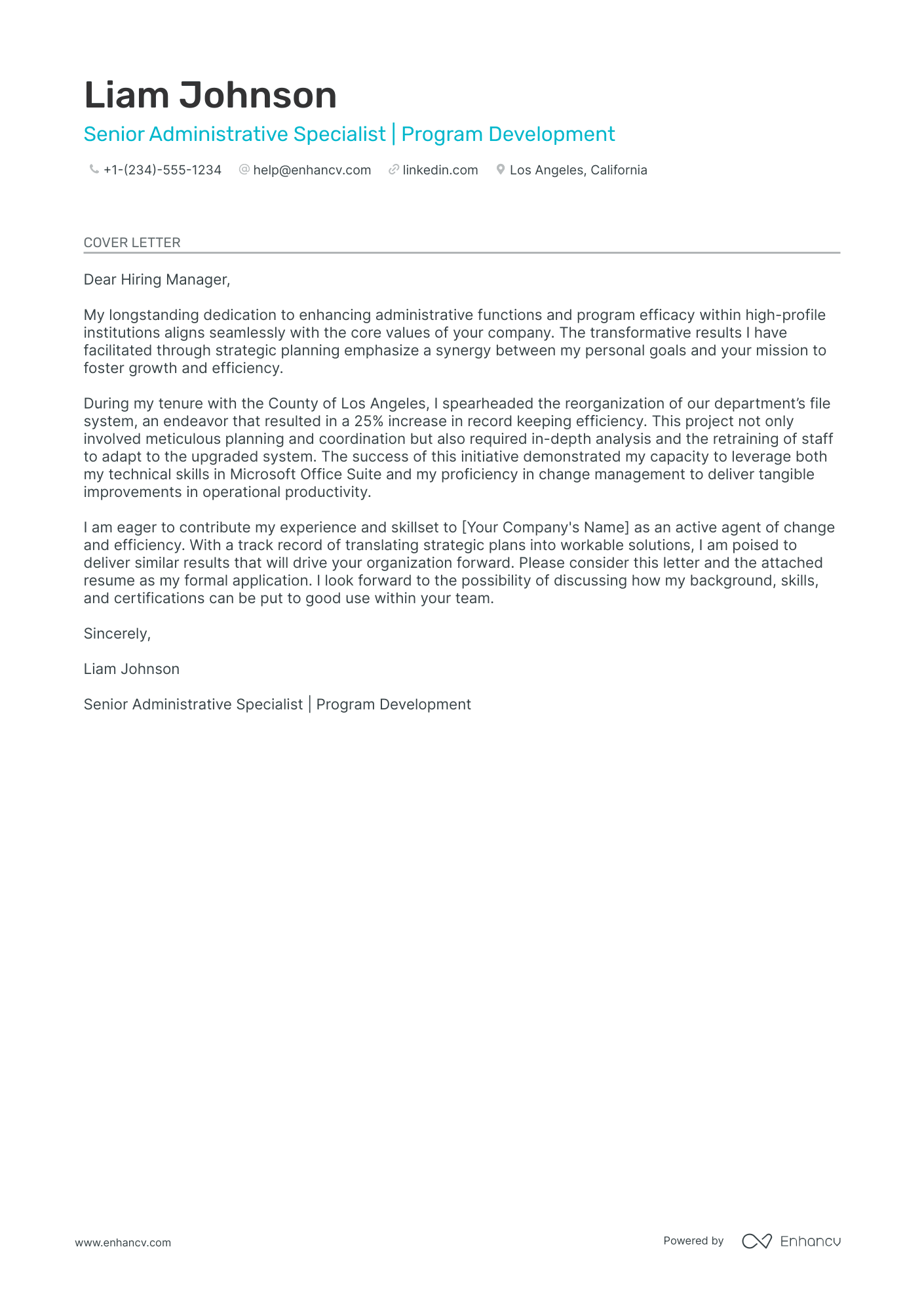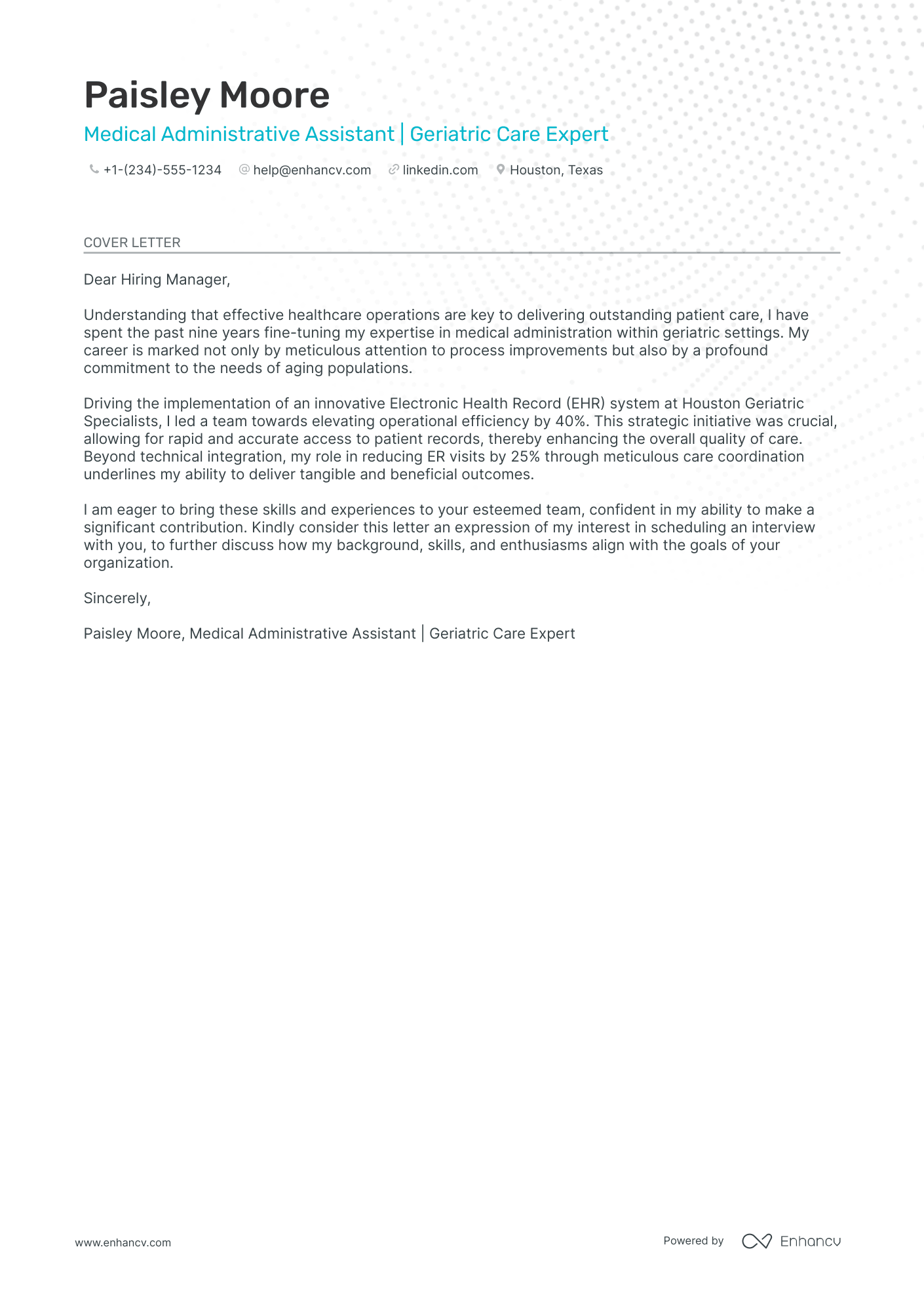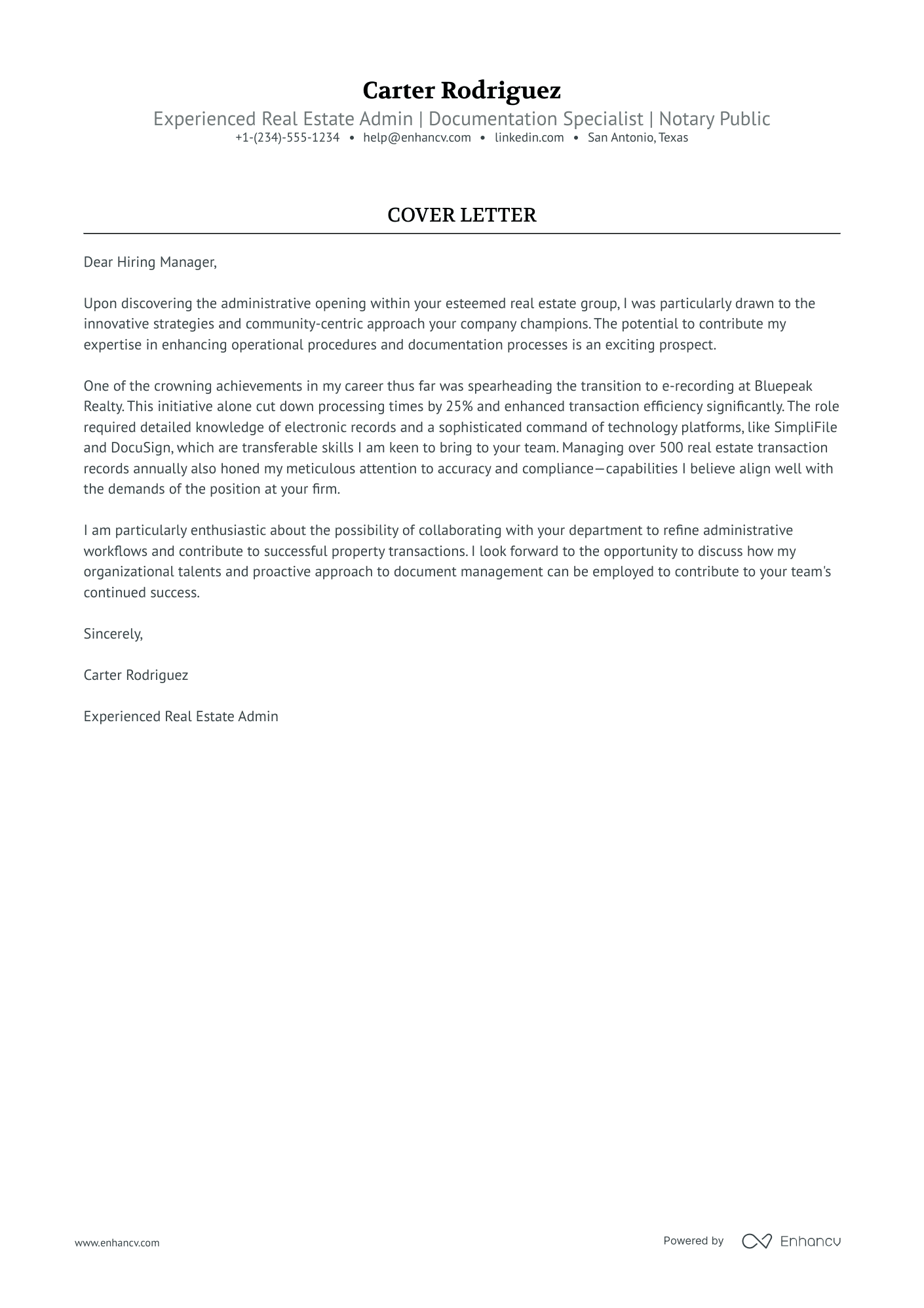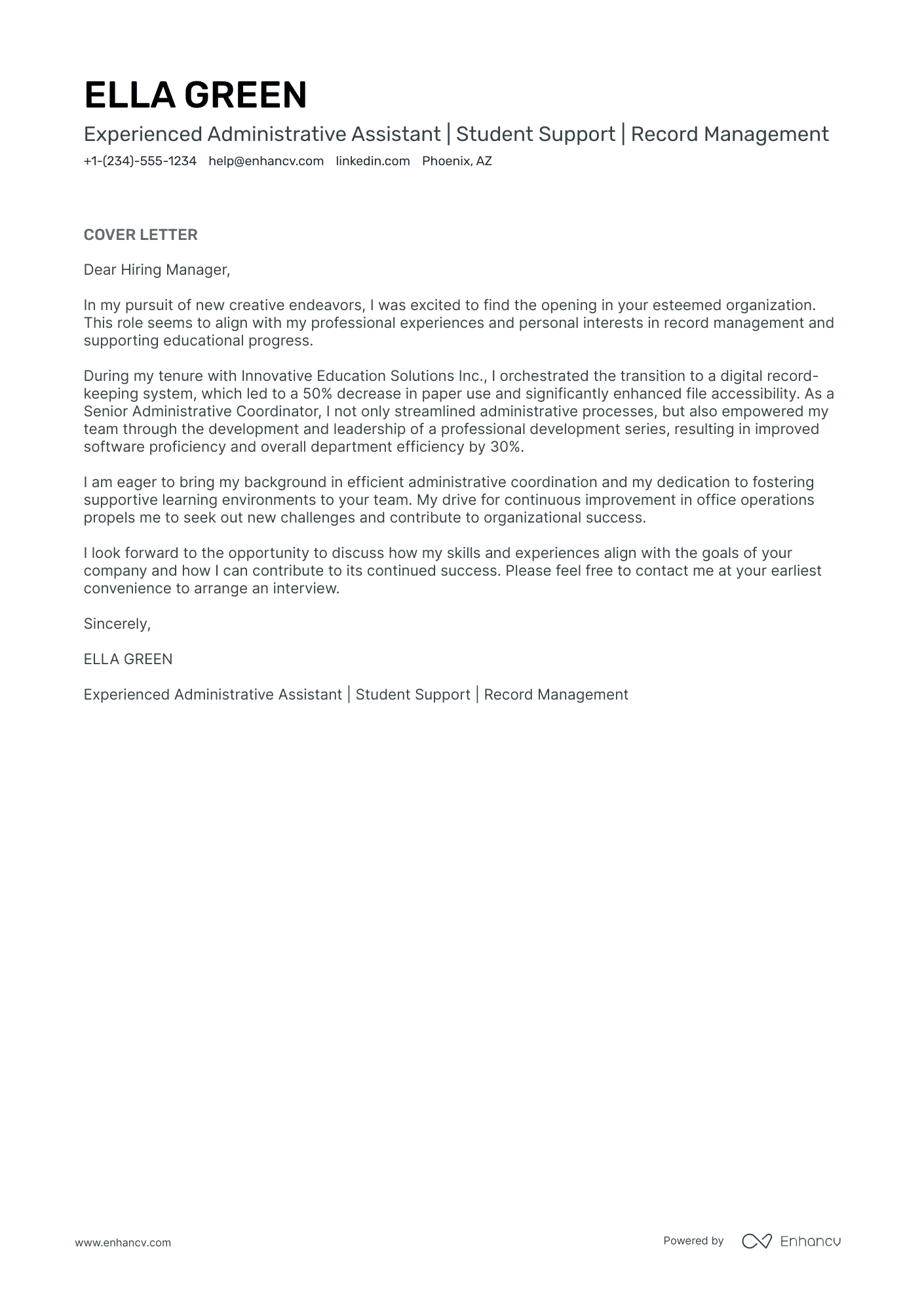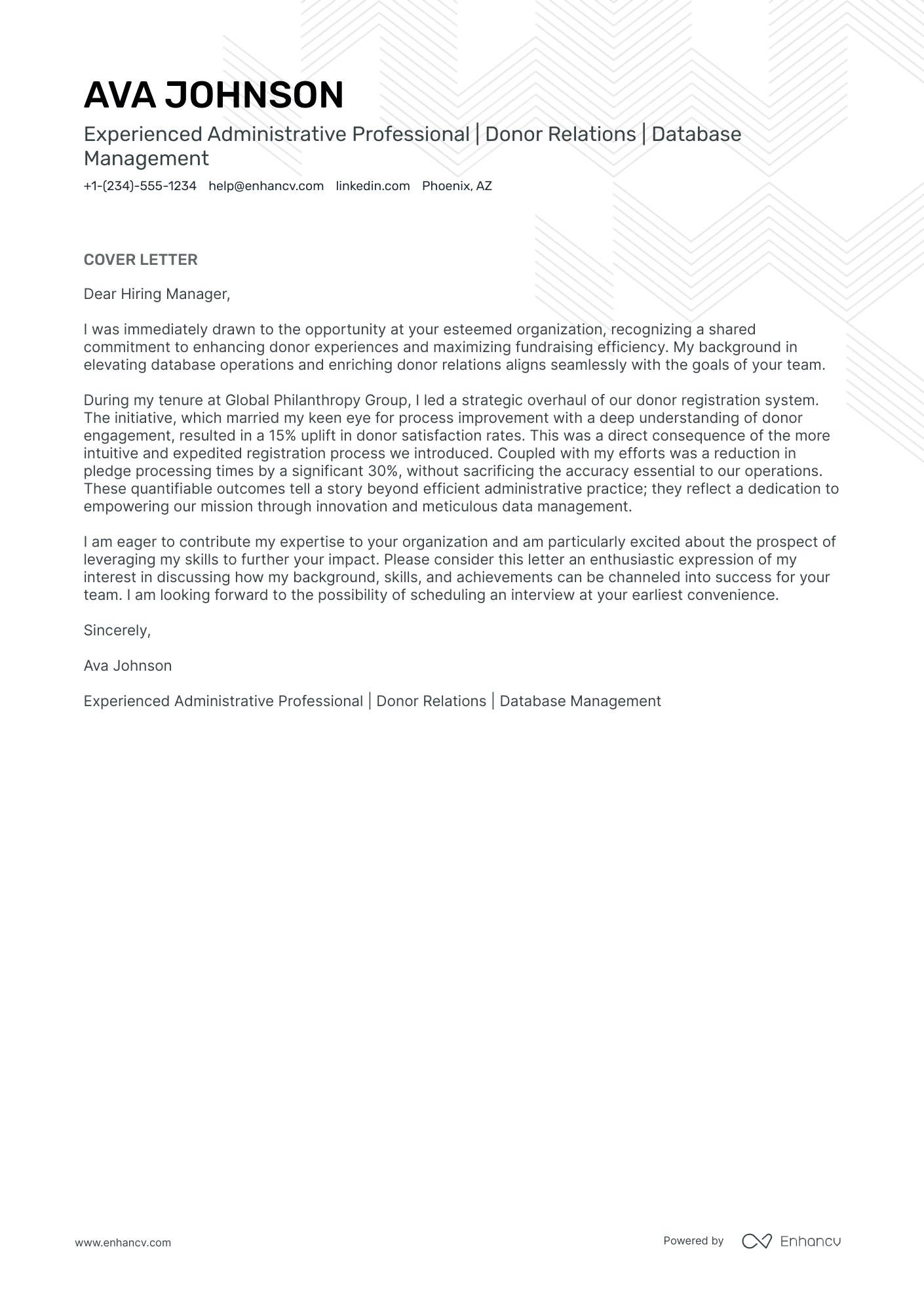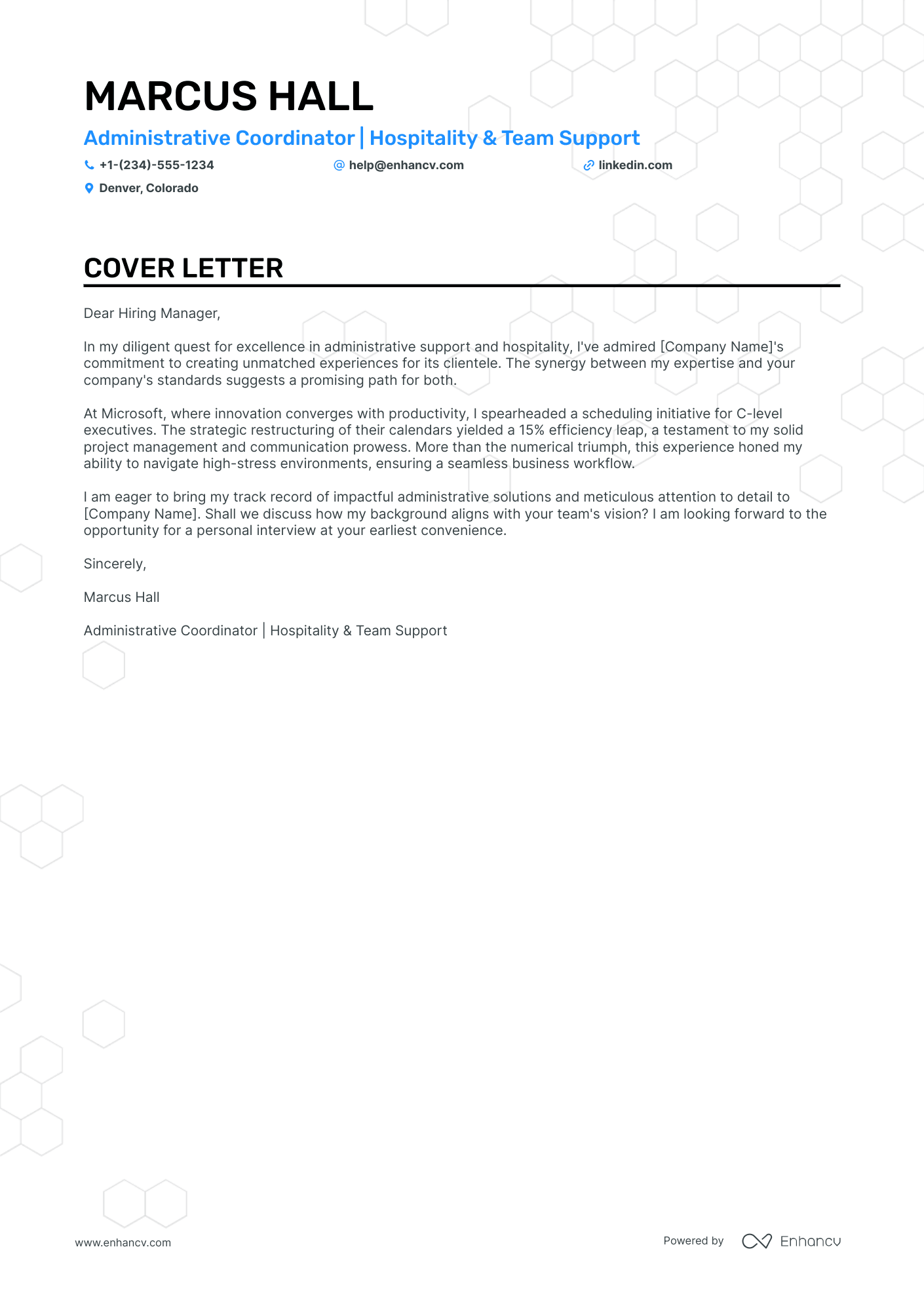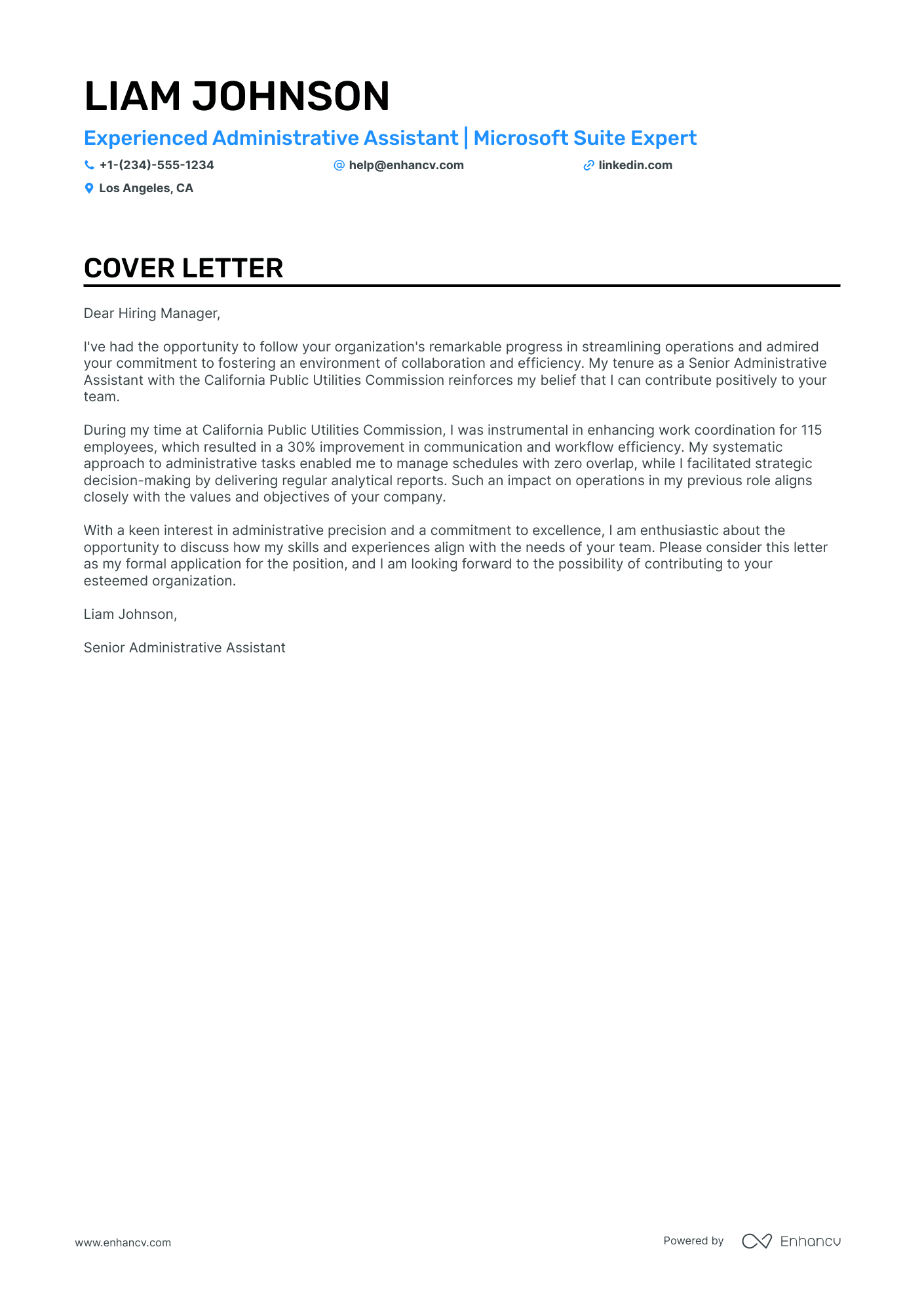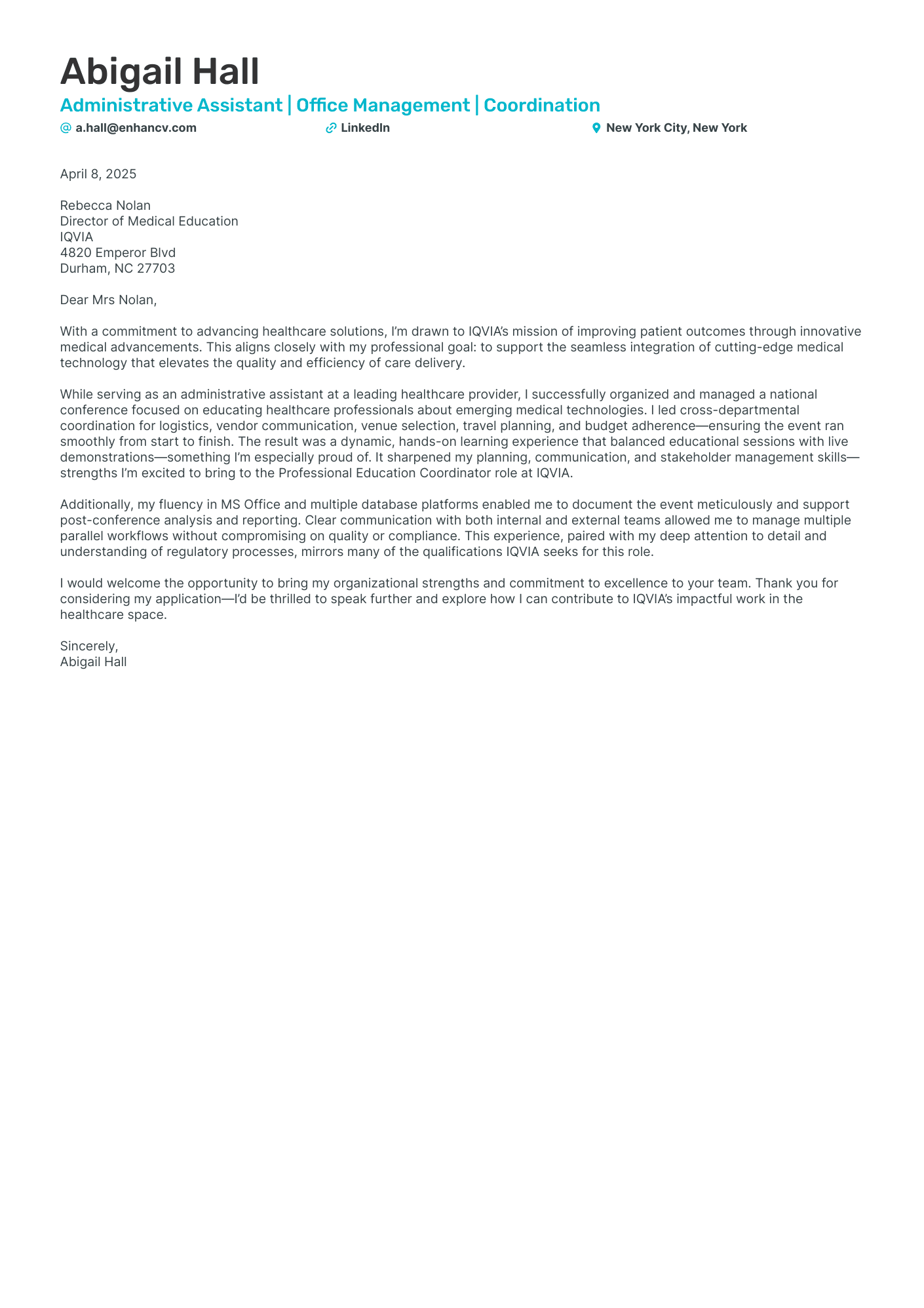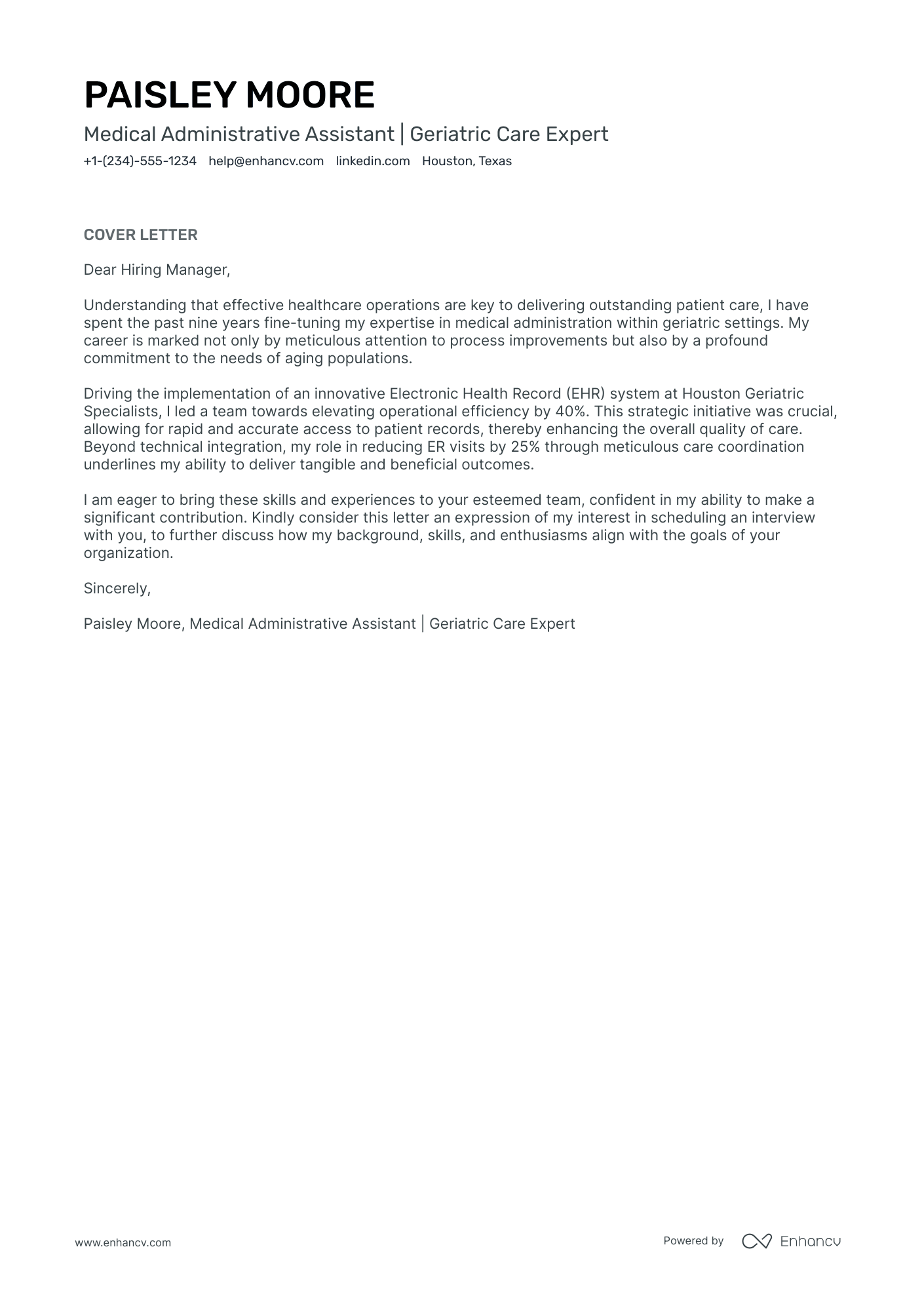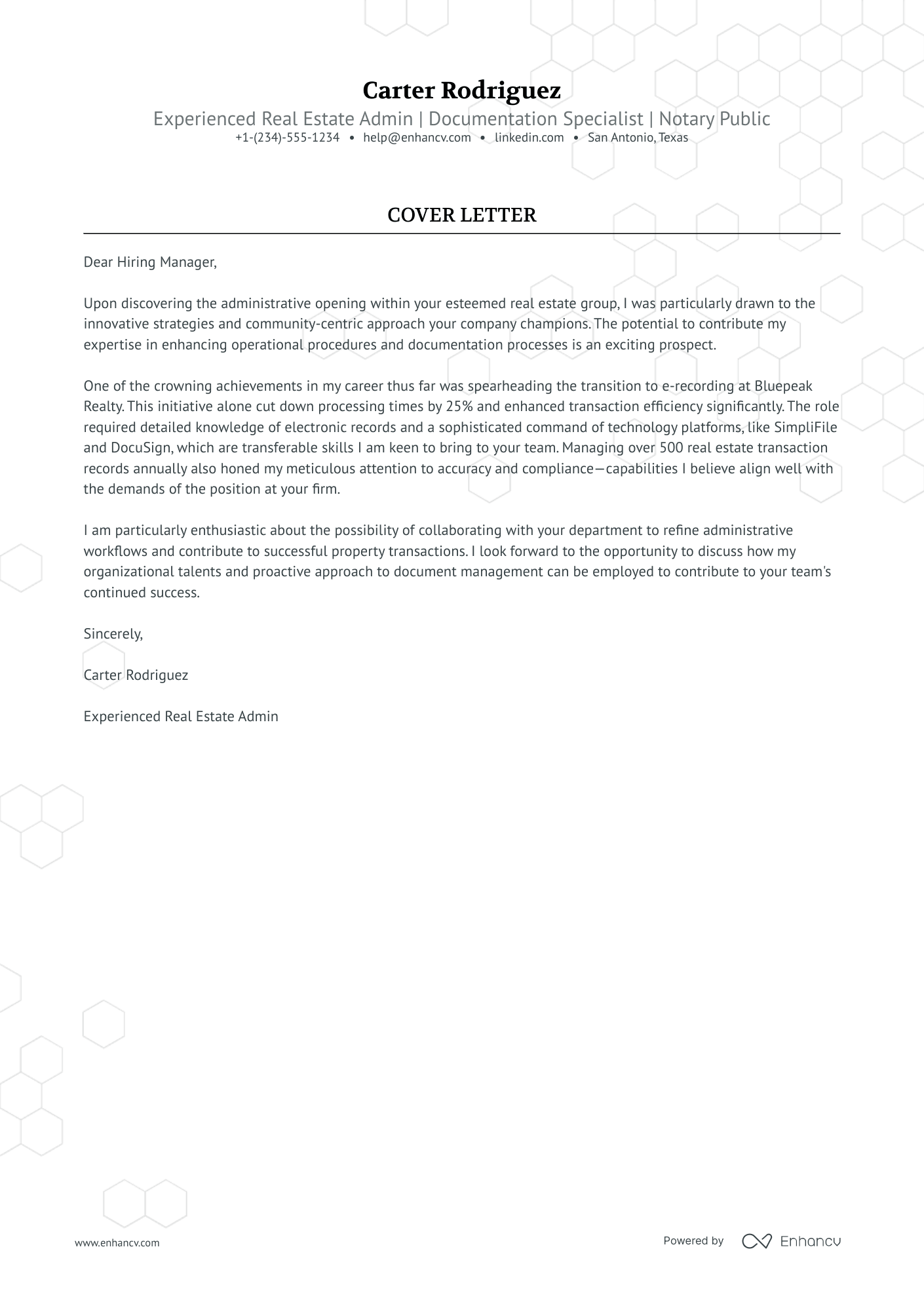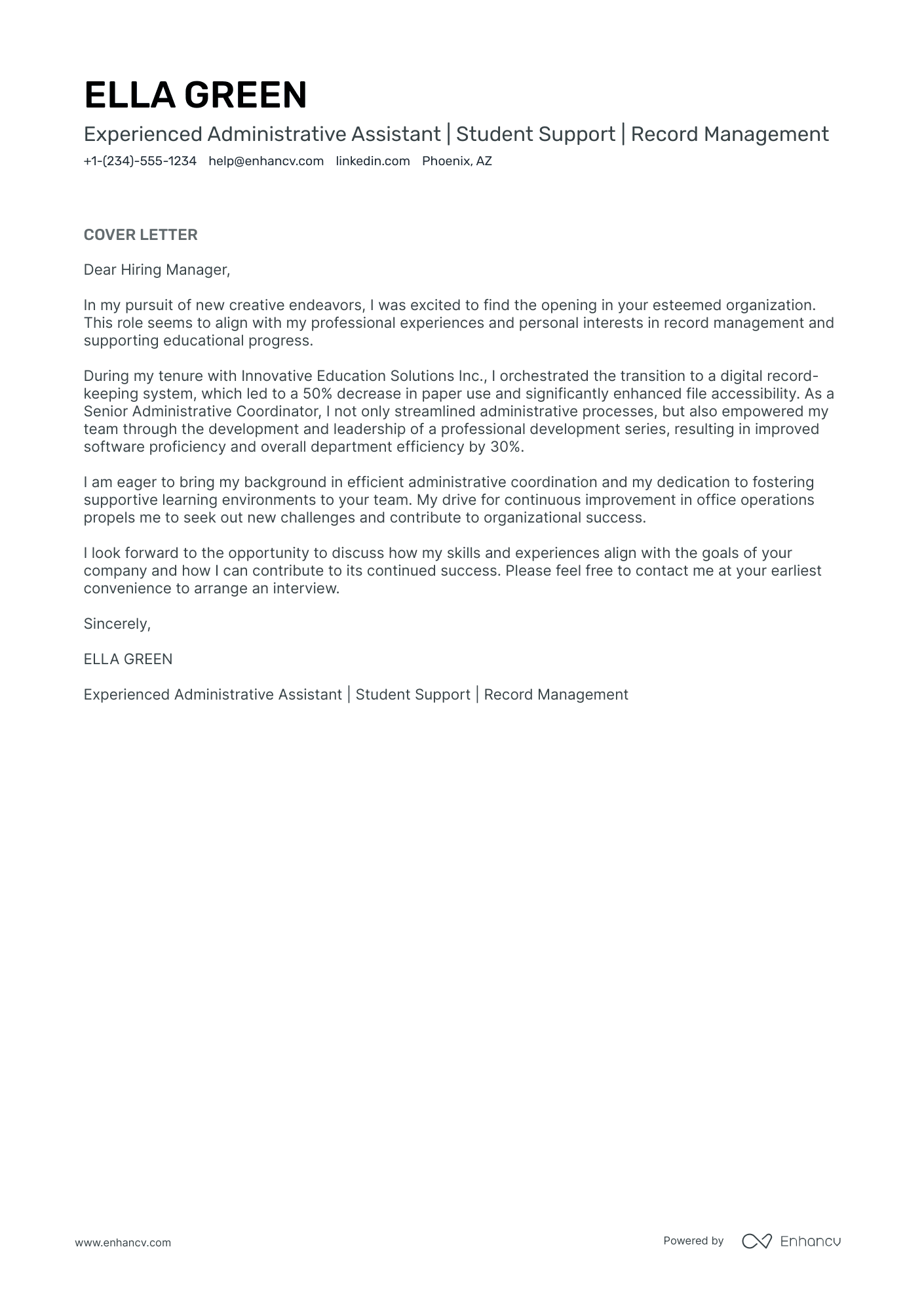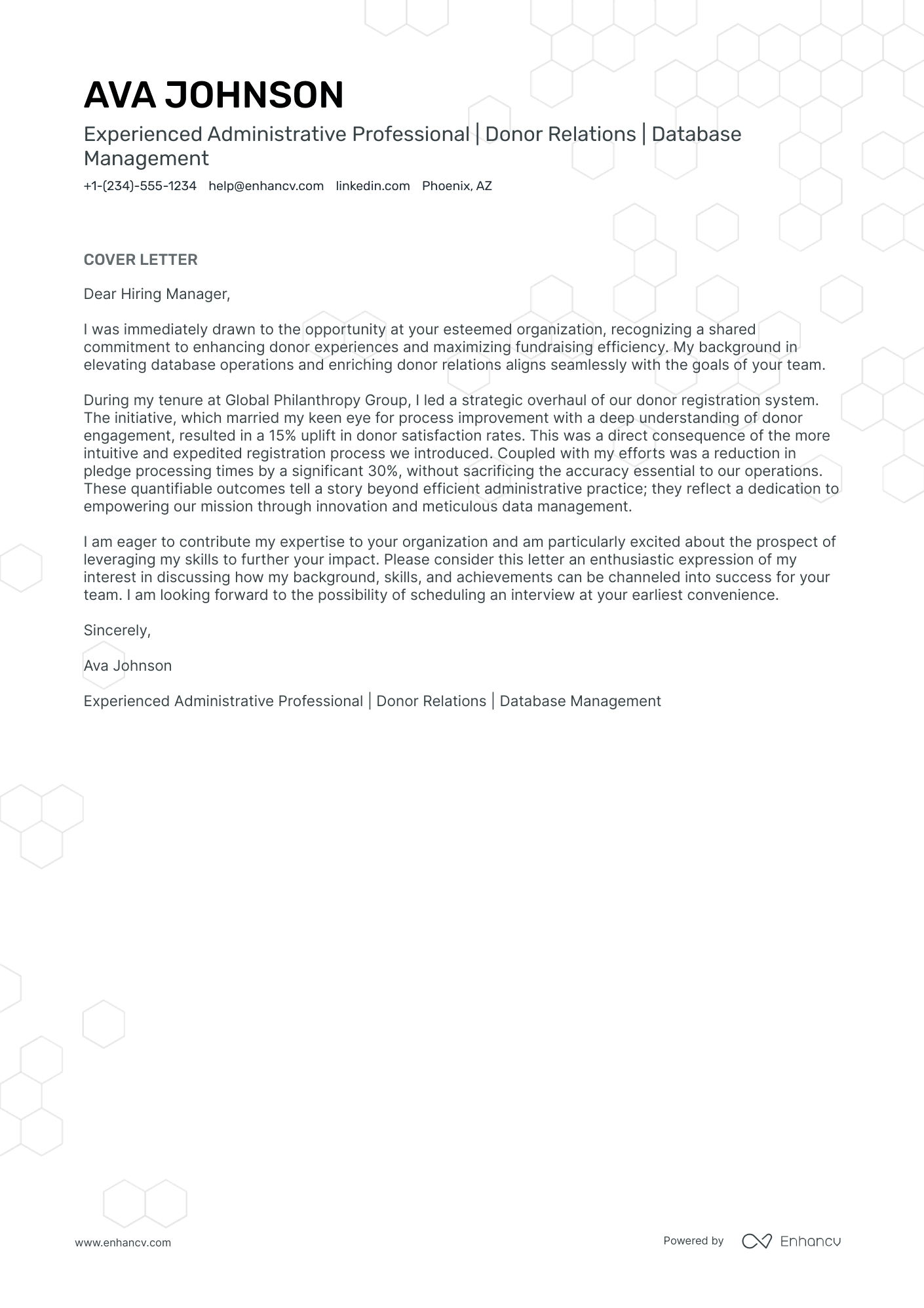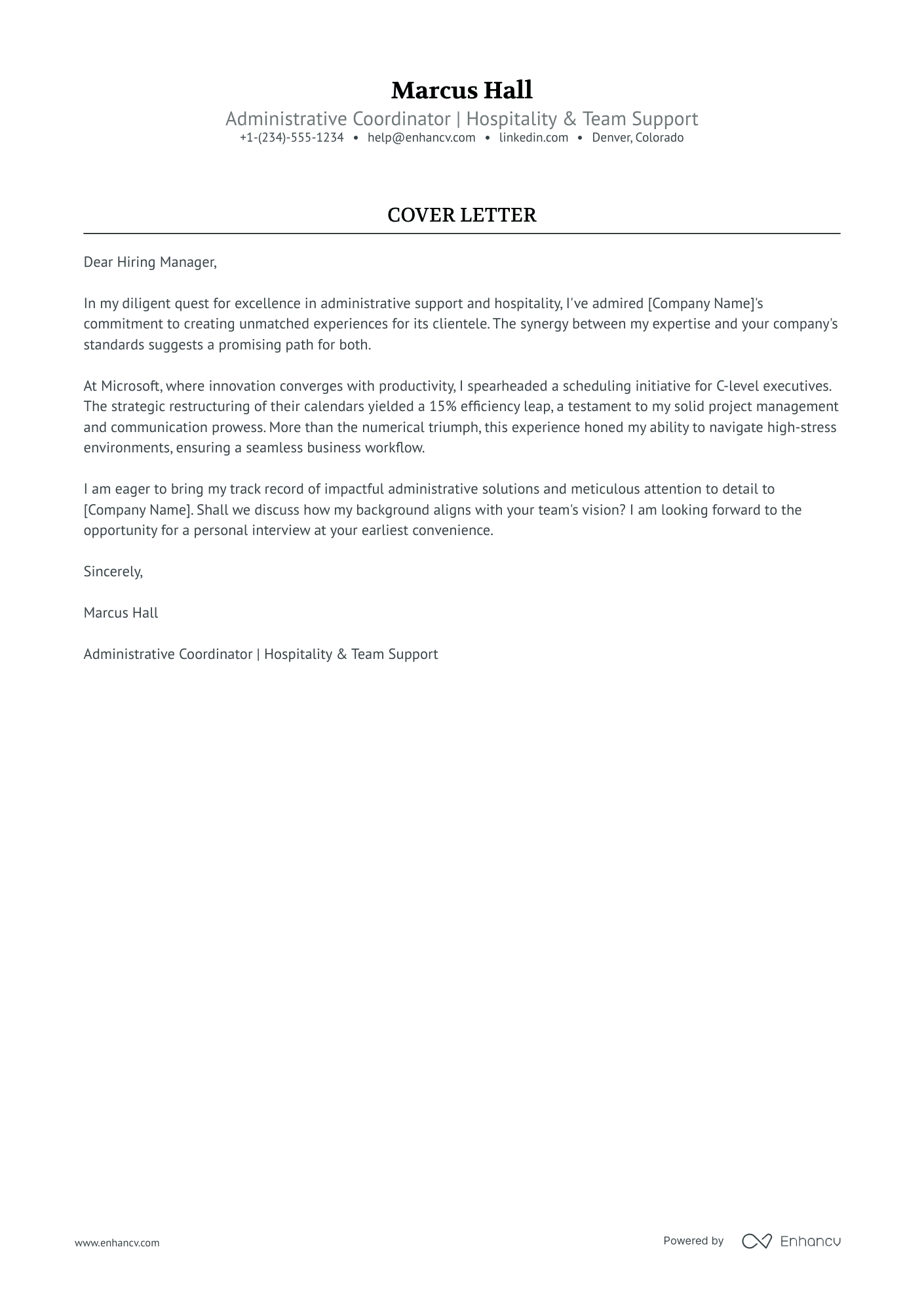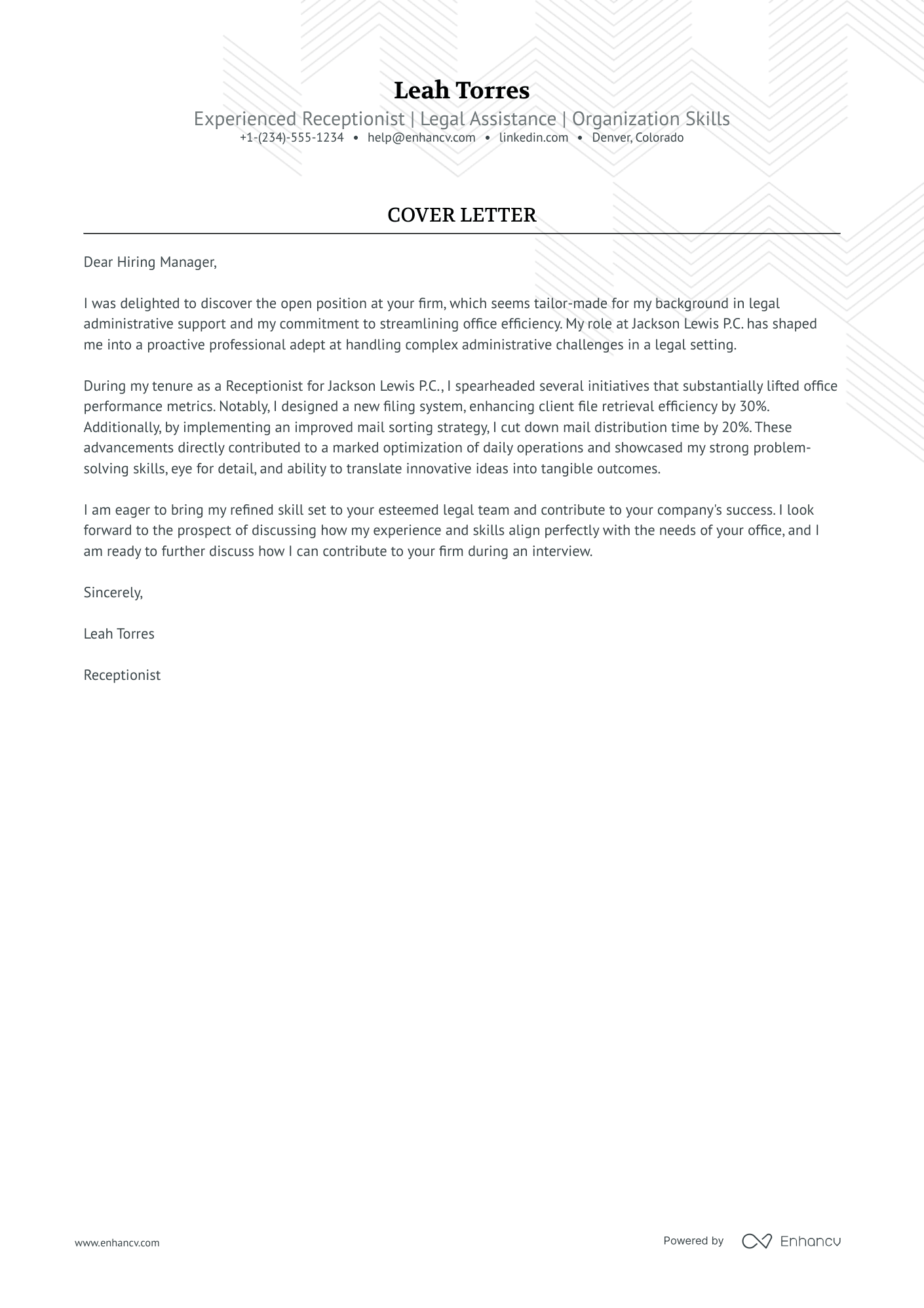If you're applying for an administrative assistant job, a strong cover letter can make all the difference. Administrative assistants are both the face and the foundation of a workplace. They’re often the first person clients or colleagues meet—setting the tone with a warm greeting or a well-timed calendar invite.
But behind the scenes, they’re quietly keeping everything running: organizing chaos into order, anticipating needs before they arise, and making sure no task, big or small, falls through the cracks. Their impact might go unnoticed on paper, but in the rhythm of a well-run office, it’s unmistakable.
Administrative assistant roles are highly competitive, with many candidates bringing similar skills to the table. What sets you apart is your ability to clearly convey reliability, initiative, and a people-first mindset.
A strong cover letter turns a standard application into a compelling case for why you're the one who keeps the office running—both front and back.
Key takeaways
- A great administrative assistant cover letter highlights organizational, communication, and tech skills. It emphasizes your ability to support executives and cross-functional teams efficiently.
- Proper formatting—clean fonts, one-inch margins, and concise structure—shows attention to detail.
- Open with a strong, specific introduction that connects your strengths to the company’s needs.
- Use the body to show real impact: tell a compelling story or share bullet-point accomplishments.
- No experience? Focus on transferable skills, motivation, and relevant volunteer or school projects.
- End with a confident closing paragraph and a polished, professional sign-off tailored to the company culture.
Cover letters for administrative assistant roles should go beyond listing responsibilities—they should capture the value you bring to a well-functioning office. Use our Cover Letter Builder to create a personalized draft in minutes, then refine it with the examples and tips below.
Drop your resume here or choose a file.
PDF & DOCX only. Max 2MB file size.
Administrative assistant cover letter example
Look at the example we created with the Enhancv Cover Letter Generator. It’s quick and intuitive to use—just upload your resume and wait for it to do its magic. ✨
How to format an administrative assistant cover letter
Just like a well-organized filing system or a smooth client call reflects an assistant’s value, a clear and polished cover letter helps hiring managers quickly understand your professionalism and fit for the role. In a field where precision and communication are key, your cover letter layout should speak volumes before a single sentence is read.
Recruiters often scan applications quickly, so structure and readability can be the difference between being noticed and being skipped.
Your document has two main elements: the header and the body of the letter. Let’s see some concrete formatting tips for each.
Contact information
Even if your resume includes these details, it’s essential to repeat them in your cover letter. A misplaced digit or missing email could cost you an interview, so double-check this section.
Here’s how to format it:
- Start with your full name at the top for quick recognition.
- Write your phone number, a professional email address, and optionally, your city and state.
- Add a LinkedIn profile or link to a personal website if it showcases your work or certifications.
- Below your info, include the current date.
- Add the hiring manager’s name (if known), their title, and the company’s name and mailing address.
PRO TIP
Most importantly, your cover letter header should be identical to your resume header. That gives your application uniformity.
Now, let’s discuss some general formatting tips for your text.
Font, spacing, and margins
Administrative assistants are champions of clarity and structure—your cover letter should follow suit. The design of your letter should be functional and professional, with as few distracting elements as possible.
Follow these tips to ensure your formatting reflects your attention to detail:
- Use a professional font like Arial, Calibri, or Rubik at 10–12 pt size, ideally matching your resume.
- Stick to single-line spacing with margins identical to the ones on your resume for a sleek appearance.
- Left-align your text to make it easy to read at a glance.
- Keep your document up to one page, ideally between 250–350 words. A short cover letter for an administrative assistant can convey your strong points without boring the reader.
Do you always need to write your cover letter in a separate document? No. Sometimes, depending on the employer’s requirements, an e-note might be more appropriate than a cover letter. Check out the table below to learn the differences.
Cover letter vs. e-note
| COVER LETTERS | E-NOTES |
|---|---|
| The classic way to go | Easier to read on mobile devices |
| Follow standard business letter format | Follow a standard email format |
| More formal and longer | Less formal than a cover letter and shorter than one page |
| Enclosed as a separate printed document/attachment | Written directly in the email body |
The top sections of an administrative assistant cover letter:
- Header: This section includes your contact information and demonstrates your attention to detail, an essential skill for administrative assistants who often manage correspondence and records.
- Greeting: A personalized greeting shows professionalism and initiative—both vital traits for admin roles that require regular communication with staff, clients, or executives.
- Introduction: The intro should highlight your enthusiasm for the role and mention your most relevant administrative experience, setting the tone for the rest of the letter.
- Body: This is where you showcase your organizational abilities, scheduling experience, and familiarity with office tools, connecting your skills directly to the company’s needs.
Closing: A strong closing reiterates your interest, invites follow-up, and reflects your communication style—important for roles that often serve as the first point of contact in an office.
Key qualities recruiters search for in an administrative assistant cover letter:
- Organizational skills: Essential for managing schedules, documents, and workflows to keep the office running smoothly.
- Office software proficiency: Key for handling emails, calendars, data entry, and document creation using tools like Microsoft Office and Google Workspace.
- Clear communication: Crucial for drafting correspondence and interacting with clients and internal teams professionally.
- Confidentiality: Vital due to frequent handling of sensitive information and internal communications.
Multitasking and problem-solving: Needed to juggle priorities, resolve issues, and support multiple team members efficiently. - Customer service mindset: Important for being the welcoming, helpful first point of contact for clients and visitors.
Wondering how to begin your cover letter? A strong greeting sets you off to a great start.
How to write your administrative assistant cover letter salutation
Greeting people professionally is second nature to administrative assistants—after all, you’re often the first face (or voice) representing the company. That’s why your cover letter salutation should reflect the same courtesy and attention you’d show in a client email or executive memo.
If the hiring manager’s name isn’t listed in the job description, take a moment to do some light research. Look at the company’s LinkedIn page, check the “About Us” or “Team” sections on their website, or even call the company directly to ask.
If a name still isn’t available, you can still choose a greeting that’s polished and tailored to the team you’re applying to support.
Skip outdated greetings like “To Whom It May Concern,” and instead go for one that reflects your professionalism and people skills.
What to use when you don’t know the hiring manager’s name
- Dear [Hiring Manager’s Name],
- Dear [Company Name] Administrative Team,
- Dear [Department Name] Hiring Manager (e.g., Dear Operations Hiring Manager),
- Hello [Company Name] Office Team,
- Dear Administrative Leadership at [Company Name],
- Dear [Company Name] Recruitment Team,
A thoughtful greeting sets a professional tone—exactly what recruiters expect from someone who will be representing the company daily.
In the next section, we’ll discuss how to write a compelling introduction.
How to write your administrative assistant cover letter intro
Think of your cover letter introduction like the opening line of a great client call—it should be clear, confident, and immediately helpful. For administrative assistants, especially those early in their career or seeking to grow into a more senior support role, your intro is your first chance to set the tone, show professionalism, and grab the hiring manager’s attention.
A strong introduction answers three key questions:
- Why this role, at this company? Show you’ve done your homework. Mention a specific aspect of the company’s mission, culture, or operations that genuinely appeals to you—something that reflects intention, not desperation.
- What makes you a strong fit? Mention your experience level, and the types of tasks you’ve handled (e.g., scheduling, correspondence, vendor coordination), and lead with a result-driven skill or accomplishment.
- How can you add value? Hint at how your presence can help their team run more efficiently, communicate better, or stay more organized.
Avoid overused openings like “I’m writing to apply for the administrative assistant position.”
Instead, start with a moment that immediately reflects your impact and relevance.
Admin assistant cover letter intro
Last quarter, I streamlined a meeting scheduling process that reduced conflicts by 60% and saved over five hours a week across our executive team. With experience in calendar management, internal communications, and office operations, I’m eager to bring that same efficiency and focus to the team at Bright Solutions—an organization whose commitment to operational excellence mirrors my own.
This works because it leads with a quantifiable result, highlights role-specific strengths, and shows a clear alignment with the company’s values—all in a short, compelling paragraph.
Now, onto the body of your letter.
How to write your administrative assistant cover letter body
The body of your cover letter is where you turn interest into impact. Rather than repeating your resume, use this space to call attention to specific examples that show your ability to stay organized, communicate effectively, and keep daily operations running smoothly.
Focus on how you solve problems, support teams, and bring structure to a fast-paced environment. Use numbers when possible and align your experience with the company’s needs.
Key areas to highlight:
- Office management and logistics: Show how you’ve handled scheduling, coordinated meetings, or streamlined systems to boost efficiency.
- Communication and professionalism: Highlight your ability to manage correspondence and act as a reliable point of contact across teams.
- Tech-savviness: Reference tools you’ve mastered—like Google Workspace, CRMs, or project management platforms.
- Proactive problem-solving: Share how you anticipated needs or improved processes without being asked.
- Discretion and reliability: Demonstrate your ability to manage sensitive information and high-priority tasks with care.
Now let’s discuss the two general approaches you can use to write the body of your cover letter.
Narrative approach
Use this format when you want to tell a focused story about a standout achievement. This works especially well for demonstrating initiative, adaptability, or the ability to support others through a high-pressure situation. It allows you to dive into the context, action, and results of a moment that wouldn’t fit neatly on a resume.
Administrative assistant cover letter body #1
Last year, when our CEO’s schedule became increasingly packed ahead of a product launch, I created a new calendar workflow using color-coded categories and buffer times. This cut down on scheduling conflicts by 75% and gave the leadership team back five hours a week. That experience reinforced how much thoughtful support can transform a busy office’s productivity—and it’s the kind of contribution I’m excited to bring to your team.
Bulleted approach
Ideal for when you have multiple relevant accomplishments and want to show a range of strengths. This format is easy to scan, making it a great choice if you’re applying to a fast-paced company or know your letter might be read quickly. Focus each bullet on a specific result or task, and keep them concise and impactful.
Here’s an example:
Administrative assistant cover letter body #2
As an administrative assistant, I’ve supported team productivity, improved internal processes, and ensured day-to-day operations stay on course. Key accomplishments include:
- Coordinated team meetings and executive briefings for a 5-person executive team with 98% on-time meeting rates.
- Implemented a digital filing system, reducing document retrieval time by 40%.
- Onboarded 15+ new hires by managing equipment, account setup, and orientation.
- Managed vendor contracts and tracked renewals to ensure 100% compliance.
- Organized monthly team meetings and events to boost internal engagement.
These bullets reflect a commitment to seamless operations, proactive support, and creating order amid complexity—qualities any great admin brings to the table.
If you have prior experience, crafting your cover letter becomes more straightforward. Focus on selecting the most relevant accomplishments that show how you support operations and improve efficiency.
But what if you’re just starting out? Do you write a cover letter? Yes, and let’s see how.
How to write a cover letter for an administrative assistant with no experience
If you’re applying for an administrative assistant role without much formal experience, your cover letter becomes your most powerful tool. While a resume highlights jobs and achievements, a cover letter gives you space to show your motivation, potential, and transferable skills—traits that might otherwise stay hidden.
Here’s how to make it count:
- Lead with motivation: Why administrative work? What draws you to this type of role? Show genuine interest in organization, communication, or helping teams run smoothly.
- Share relevant experiences: Even without office experience, you’ve likely developed admin-relevant skills through school, volunteering, part-time jobs, or personal responsibilities.
- Highlight transferable skills: Think about planning events, managing schedules, handling emails, or supporting a team. These show initiative and organizational ability, even outside a traditional office.
- Connect to the company: Mention something about their mission, values, or team that excites you. Mirror key phrases from the job ad (e.g., “organized self-starter” or “team player”) to show alignment.
Let’s look at an example of a strong entry-level administrative assistant cover letter:
Administrative assistant intern cover letter
MM/DD/YYYY
[Company Address]
Dear [Hiring Manager’s Name],
From managing student council logistics to coordinating nonprofit events, I’ve always gravitated toward roles that require precision, organization, and communication. That’s why I’m eager to bring these strengths to the Administrative Assistant role at [Company Name], where I can support your team’s day-to-day operations with the same attention to detail I’ve applied in every project I’ve taken on.
At university, I served as the logistics coordinator for our student leadership council, where I organized meeting schedules, prepared agendas, and communicated with faculty and student groups. I also volunteered at a local nonprofit, where I managed email outreach and tracked event RSVPs in spreadsheets—skills that directly translate to office support.
Though I may be early in my career, I take pride in being dependable, organized, and proactive. I’m drawn to [Company Name] because of your reputation for supporting employee growth and fostering collaboration. I’d love the opportunity to contribute to your team and continue learning in a fast-paced, professional setting.
Thank you for considering my application. I look forward to the opportunity to speak further.
Sincerely,
[Your Full Name]
Now that the hard work is done, let’s make sure your closing leaves a lasting impression.
How to write the closing paragraph
The ending of your cover letter doesn’t need to be complex—its purpose is to reinforce your interest, briefly restate your value, and leave the conversation open. It’s your opportunity to show confidence, express genuine interest in the team or company, and invite the hiring manager to take the next step.
In your administrative assistant cover letter closing, aim to:
- Reaffirm your enthusiasm for the role and the organization.
- Highlight your strongest, most relevant trait or contribution.
- End with an invitation to connect or discuss further.
Administrative assitant cover letter closing
With over three years of experience supporting cross-functional teams, managing complex schedules, and streamlining office processes, I’m confident in my ability to make a meaningful impact at [Company Name]. Your team’s focus on operational excellence aligns perfectly with how I approach my work—proactive, detail-oriented, and people-focused.
Thank you for considering my application. I’d appreciate the opportunity to further discuss how my background can support your team’s success.
Sign-off options for administrative assistants
For administrative assistants, the right sign-off reflects your professionalism, attention to detail, and understanding of workplace etiquette.
Below are some common sign-offs and when to use each, based on the tone and formality of your application.
Sign-off options for administrative assistants
| Sign-off | What’s the tone, and when to use |
|---|---|
| Best regards | Tone: Professional, neutral
|
| Kind regards | Tone: Professional, slightly warm
|
| Sincerely | Tone: Formal, traditional
|
| With appreciation | Tone: Grateful, polite
|
| Respectfully | Tone: Very formal
|
| Thanks again | Tone: Friendly, modern Use when you know the hiring manager or recruiter, and the company culture is informal or startup-oriented. It’s conversational while still showing appreciation. |
Attachment
Sincerely,
Lyla James
Enclosure: resume
Conclusion
A strong administrative assistant cover letter isn’t just about listing duties—it’s about showing the value you bring to a team. With the right format, voice, and examples, your letter can organize your experience as clearly as you organize an office.
Administrative Assistant cover letter examples
By Experience
Entry-Level Administrative Assistant
Administrative Assistant No Experience
By Role
